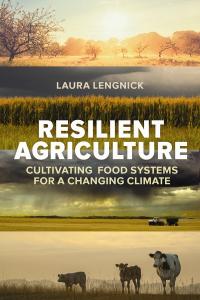Resilient Agriculture: Cultivating Food Systems for a Changing Climate
Monday January 26, 2015 from 7-8:30pm
UNCA Sherrill Center – Mountain View Room (SHE 417)
How will a changing climate affect the way we farm and what we eat? How do we begin to build resilient and sustainable food systems? Join ASAP (Appalachian Sustainable Agriculture Project) and Transition Asheville for a talk and panel discussion featuring Dr. Laura Lengnick, author of Resilient Agriculture: Cultivating Food Systems for a Changing Climate and lead author of the recent USDA report “Climate Change and U.S. Agriculture: Effects and Adaptation.” Dr. Lengnick will give a talk on climate change effects on the U.S. food system, which will be followed by a panel discussion featuring local food system and climate change leaders sharing their work to understand and prepare for climate change.
Admission to this event is free.
Agenda
7:00 pm Welcome by Dr. Leah Mathews of UNCA
7:05 pm Dr. Laura Lengnick presentation
7:30 pm Panel discussion
8:30 pm Finish
Meet the Panelists
Dr. Laura Lengnick: Professor of Sustainable Agriculture & Environmental Studies, Warren Wilson College and part-time co-Director of Resilience Initiatives at Second Nature
For more than 25 years, Laura has actively explored the potential of agricultural systems to enhance community well-being as a researcher, policy-maker, community activist, professor and farmer to better understand what it takes to move sustainability values into action on the farm, in our communities and as a nation. Along the way, her research in sustainable farming systems was nationally recognized with a USDA Secretary’s Honor Award, she gained policy expertise through work as a U.S. Senate staffer and a federal lobbyist advocating for sustainable food systems, she developed decision support for sustainable farmers, she led the development of an innovative campus sustainable dining policy, and she pioneered experiential resilience curriculum for an environmental studies program.
Laura’s most recent research work focuses on food system resilience under the challenges of climate change and resource scarcity. While working as a visiting scientist on the USDA-ARS National Program Staff in 2012, Laura served as a lead author of the report “Climate Change and Agriculture in the United States: Effects and Adaptation” which served as USDA’s technical input to the Third National Climate Assessment released in May 2014. As the lead author on climate change adaptation, Laura identified effective strategies for sustaining agricultural production in the U.S. under current climate change conditions and under the intensified climate change effects projected through mid-century and beyond. Her forthcoming book, Resilient Agriculture: Cultivating Food Systems for a Changing Climate, will be released in March 2015 by New Society Publishers
Dr. Allison Perrett: Researcher, Appalachian Sustainable Agriculture Project (ASAP)
Allison is a researcher and administrator at ASAP. She moved to the region eight years ago to study the local food movement for her dissertation research in applied anthropology. At ASAP, Allison coordinates and conducts research for ASAP’s Local Food Research Center, which is looking at how and why local food system can create positive social, economic, and environmental change.
Jim Fox: Director for the National Environmental Modeling and Analysis Center (NEMAC)
James (Jim) Fox is the Director for UNC Asheville’s NEMAC (National Environmental Modeling and Analysis Center). In that position, he serves as the team leader and principal investigator for several major collaborations that include the USDA Forest Service Eastern Forest Threat Center, NOAA’s National Climatic Data Center, and North Carolina’s Renaissance Computing Institute. NEMAC uses visualizations, GIS, web tools and decision support tools to address key societal issues that include forest health, climate change and variability, flood mitigation, water resources and future land use planning. Recent projects that have gained local and national attention have included NEMAC’s work on:
- The US Climate Resilience Toolkit for the White House launched in November, 2014
- National Cohesive Fire Project with the USDA Forest Service and Dept. of Interior
- The Western North Carolina Vitality Index – a sustainability report card that includes over 200 metrics covering water resources, human health, housing, the local economy, and many more items
Jim holds undergraduate degrees in Geology/Geophysics and Communications and a Master’s Degree in Information Technology for Informal Education. He spent 25 years working in the oil exploration business, a job which took him all over the world. He has produced animations and visualizations for national parks and earth science museums nationwide, including the major museums in Denver and Houston and the local Colburn Earth Science Museum in Asheville. He returned home to Asheville in 2002 to pursue his passion of utilizing community collaborations and computer technologies to aid in complex decision making.
Sally Eason: CEO Sunburst Trout Farms
Co-owner of the Sunburst Trout Farm on N.C. 215 near Bethel, Sally and her family have operated the business since 1948, when her father Dick Jennings decided to start hatching and selling fish eggs. Through the good, the bad, and the ugly, Sunburst Trout has persevered and evolved into a national brand for high-quality trout products, many of which find themselves on the plates of the some of the finest restaurants in the country.
Charlie Jackson: Executive Director of Appalachian Sustainable Agriculture Project (ASAP)
Charlie has extensive experience in developing and implementing local food campaigns and creating local food systems that are socially just, health promoting, sustainable, and that build local economies. He has been responsible for the successful development and implementation of programs in farm to school, farm to hospital, farm to chef, direct sales, regional branding, farm tourism, and more. He is the founder of numerous farmers markets and farmer associations, a community organizer, and a researcher on local food system development. He initiated and currently serves on the North Carolina Local Food Policy Council and serves on the Buncombe County Public Health Advisory Council and the WNC AgriVentures Innovation Council. Charlie will be the moderator of the panel discussion.

